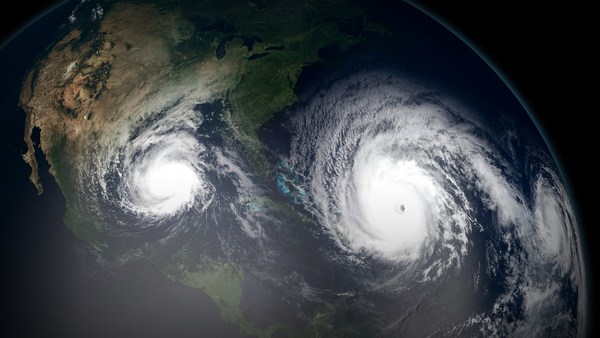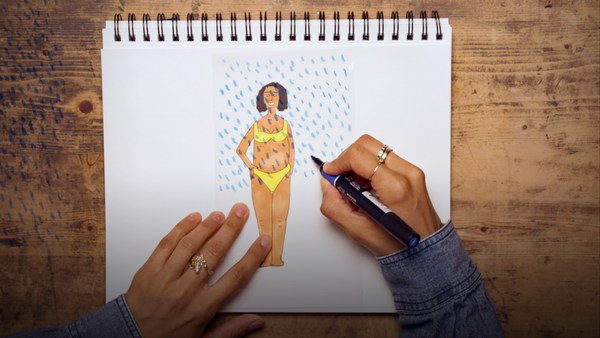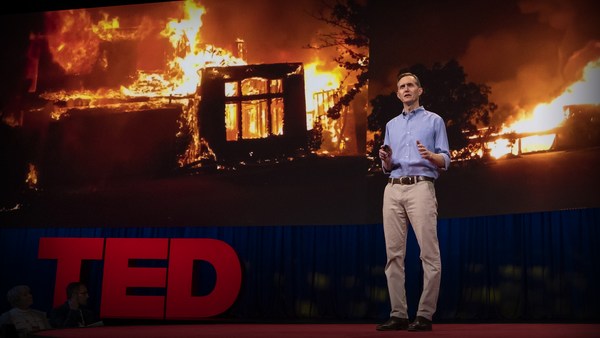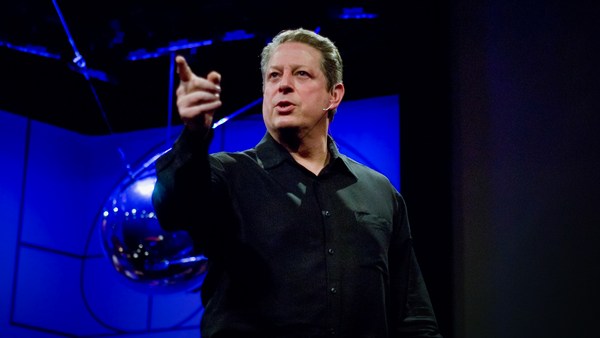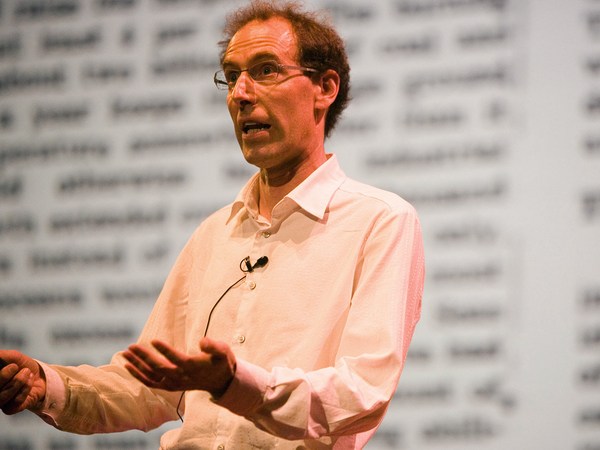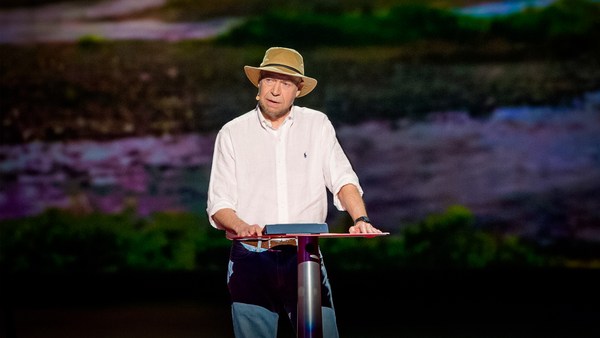I first started doing television weather in 1974 when I was a sophomore in college, and I have seen a lot of changes that I know you have. From history-making hurricanes, we're talking about record-breaking blizzards. I've been --
(Laughter)
Yeah, OK, laugh at my suffering. I'm glad you feel that good. Hurricane Sandy, this was really, to me, a game changer as far as climate, when people realized what was going on. Hurricane Ida, which came onshore, causing massive problems not just at landfall but also as it moved inland causing massive, massive flooding. A lot of us recently experienced dangerous air quality because of wildfires up in Canada, that smoke stretched as far south as Atlanta. We're also experiencing atmospheric rivers, cyclogenic bombs of low pressure. We’ve also looked at rising ocean levels and, of course, paralyzing winter storms, stretching from Texas into the northeast, unprecedented heat and flash flooding all within the last couple of weeks. If we were to talk about everything that's going on, all these extreme weather events that have been happening in the last couple of years, we would literally be here for a couple of hours.
So we just wanted to take a look at some of the extreme weather events that are being fueled by climate change. So we boiled it down to a few key bullet points, talking about hurricanes, tornadoes and wildfires. And literally this is the tip of the iceberg when it comes to climate change.
Let's talk about, for example, hurricanes. Did you know that between 2016 and 2019, we had four straight years with Category 5 hurricanes? That's the top of the level. That is unprecedented. And beyond the increasing frequency, hurricanes are also intensifying more rapidly. We're seeing that happen time and time again with these hurricanes as they approach shore. And this is because the environment is favorable, because the ocean waters have heated up.
Now, let's talk about tornadoes. Same thing goes for this. Studies have shown an increase in tornado frequency, more EF2 tornadoes in the Midwest and the Southeast. There's actually been a diminution of those tornadoes in the traditional tornado belt. They have moved east, south and north in areas that are a lot more prevalent with larger populations. And we're talking about more tornadoes during winter, which is really something that we haven't seen in the last ten years.
Wildfires. OK, we know about the wildfires that happen out West, and the average acreage burned in warm season has nearly doubled. There is no more wildfire season out West. And the folks out West were laughing at us in the East saying, "Hey, get used to it. This is what we've been seeing." We're getting used to bad air quality. And in fact, the intensity from these frequent wildfires has led to the deterioration of our lifestyle, our air quality, loss of property and crops. It is just really one of these things that is changing how we live.
But what happens to those folks who actually struggle? Struggle with the actual impacts of climate change? Now, we've known for years that communities that are most vulnerable to the effects of climate change are the ones that are least responsible for climate change itself. In fact, the most recent Intergovernmental Panel on Climate Change, the IPCC, estimates that in the next 30 years, and that's not that long, 140 million people will be displaced worldwide. That's more than the population of Russia. That's how many people we're talking about. Here in the United States, federal government has had to start to compensate Indigenous communities because they've had to move because of sea level rise and warming of the atmosphere. We were recently in Alaska and saw the change that has happened to the Indigenous communities there because of their lifestyle, their community and their heritage is being lost because of this.
Now about 75 percent of the world lives under the poverty line in rural areas. And these are the same areas whose natural resources are being undermined and destroyed by extreme drought, torrential rainfall and wildfires. And even though they try to do what they can, these events often force these communities from their very homes, changing their lives, their communities and their culture.
Now, outside of our cultural communities, climate change has an effect on our national security. And that change of climate is going to affect the ability to train war fighters, to maintain facilities at home and abroad and to be able to operate effectively with a fighting force because of climate change. And in fact, a recent report by the Rand Corporation highlighted how climate change is already affecting military sites all around the world because of the diversion of funds to have to harden these sites against climate change.
And you think about vulnerability, one of the things we have to think about, the people who work outside, in one of the earlier sessions, we had some farmers here talking about this. Well, farmers, farm workers, outdoor industries, construction workers, even our kids at summer camps, they have to change how they work because of hotter and hotter summers.
Now what can we do? How do we change things? How do we get those solutions going that help us harden ourselves against climate change? Well, one of the most impactful options is electrification. Sure, we think about cars, but what about stoves? What about lawnmowers, leaf blowers? In fact, a recent automotive test -- think about this, running a leaf blower for 30 minutes adds more pollution to the atmosphere than an F-150 truck driving 3,800 miles.
(Audience) Whoa! One leaf blower. And not to mention the noise. You change over to an electric leaf blower ... OK --
(Applause)
I'm not sure if you're against electric or leaf blowers, but you should be for both. And of course, everybody will appreciate it, not only your neighbors, but your animal neighbors as well.
And in fact, when we talk about our lawns, because a lot of lawn care goes into this, we need to stop thinking about, you know, that green, lush lawn. Let's rethink that to using more shrubbery, more brushes, more drought-resistant plants. It’s called xeriscaping. So that there’s less green as far as lawns, well-manicured lawns, and more natural, indigenous plants that help conserve water and help the actual planet keep that water in.
And then there's another area that we can talk about. I know you look at me and you think, "Yes, he's fashionable. Yes, he's GQ." Right? OK. Well, the fact of the matter is, you know, fast fashion, that is just a real detriment for our environment. It's cheap, quick, mass-produced fashions that are meant to be discarded, fill up our landfills, cause pollution because of the dyes that are used. So what you end up doing is adding to landfills and spending a lot of money. Instead, find good, durable, sustainable clothing that's going to last more than one season and you help reduce our landfills and causing more problems. And look good doing it, too.
(Laughter)
And lastly, the most important thing. Engagement. You have to be engaged. You have to know, let your elected officials know that this is important to you. You have to vote. You have to vote. You have to go out there and support politicians who are going to support our planet.
You know, one of the things that has changed my outlook in a very short period of time. Nine days ago, I became a grandpa.
(Cheers and applause)
I thought you’d pause and think, “He’s not old enough.” But. Obviously that's not the case. But I was holding my new granddaughter, Sky, which is -- I love the name. Aww. And I was literally, on Tuesday, sitting about two hours, holding her, while I let my daughter and her husband get a break. And I was thinking about giving this talk. And I was thinking about, what kind of world is she going to have? I mean, let's face it. I'm only going to be here, if I'm lucky, maybe another 15 years. Who knows? But it's her world. All of our grandkids and their kids, it's going to be their world. What world are we leaving them? This younger generation is going to fight this fight. So support them. Support politicians who decide that our planet and its health is the more important thing, that climate change is the most existential threat to our survival. And make sure that you do what you can. Be conscious of the decisions you make. We can all get together and make each individually come together and make a great change and change our planet.
Thank you very much.
(Cheers and applause)
